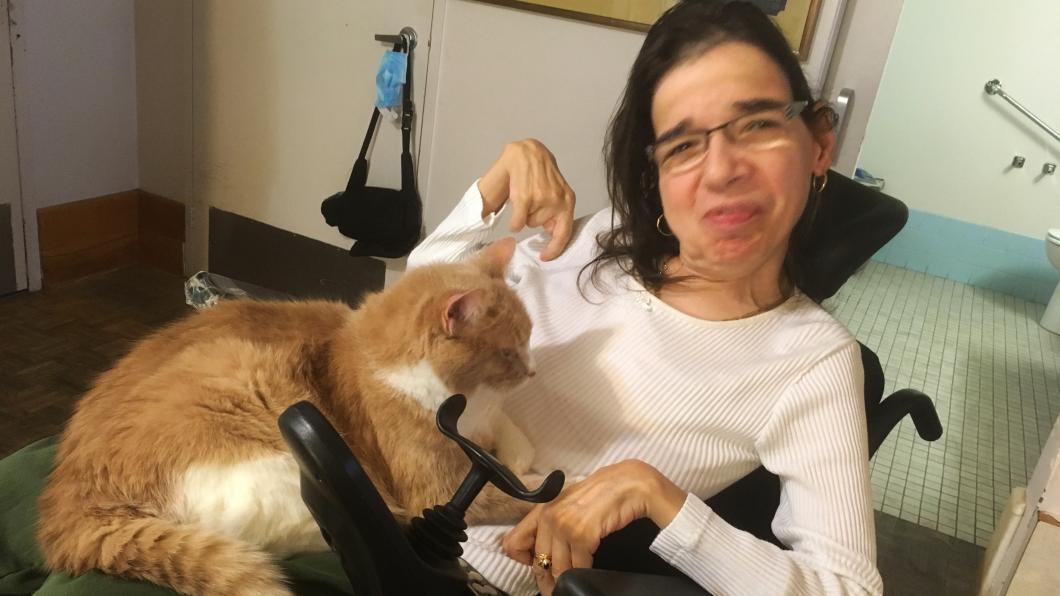
Inaccessible diagnostic equipment puts Ryerson student's health at risk
By Louise Kinross
Rosie Isabella is a Ryerson student who had a painful and demeaning experience trying to get a mammogram test at a Toronto hospital last month. She uses a wheelchair, and even though she had brought a personal support worker, she struggled to get close enough to the machine to have images taken.
"I didn't want to bang my knees and they needed to put many things behind me to bring me forward," Rosie says. "This put a strain on my body which caused me to hyperextend like a contorted pretzel. They couldn't get the required pictures and referred me back to my family doctor to see if there was a different test that could be done.
"I asked 'What do you do with other patients who use wheelchairs?' and the technician said: 'We are the only hospital that takes wheelchairs.' I said 'No you don't. The wheelchair doesn't come on its own. There are people in wheelchairs.' We live in Canada, are we not deserving of adequate, equal care?"
Inaccessible medical equipment is a serious and longstanding problem. A literature search did not yield any national standards for accessible diagnostic and treatment equipment in Canada. The American National Council on Disability published a report in May this year that documents significant barriers to preventative, primary and specialty care for Americans with mobility disabilities.
While health-care providers must ensure full and equal access to their services and facilities under the Americans with Disability Act, there aren't any enforceable standards when it comes to medical equipment, the authors note.
Based on numerous studies, they say exam tables and chairs, weight scales, and imaging equipment like X-rays and mammogram machines are usually inaccessible. This leads to "delayed and incomplete care, missed diagnoses, exacerbation of the original disability, and increases in the likelihood of the development of secondary conditions." Further, most facilities lack transfer equipment and staff who are trained to help people with disabilities move to standard equipment.
In 2017, the U.S. Department of Health and Human Services issued medical diagnostic equipment standards, but the Department of Justice withdrew its plans to adopt them saying it had to reevaluate whether regulation of accessibility is "necessary and appropriate." "Without regulations, health-care providers are unlikely to alter their practices," the authors write.
The report also finds a gap in health workers' understanding of what access means; doctor misconceptions that accessible diagnostic equipment is required; no transparent complaint processes locally or nationally; and that when accessible equipment is onsite, it often isn't used, indicating a lack of staff knowledge about it. There is also no universal way of tracking disability in electronic health records to understand the need for accessible equipment.
Doctors themselves report being unable to provide equitable care to people with disabilities. A Health Affairs study BLOOM reported on in May this year found almost 60 per cent of 714 American doctors didn't feel confident in their ability to provide the same care to a patient with a disability that they give other patients.
A 2020 report from the Accessibility for Ontarians with Disabilities Act Alliance includes "the right of patients with disabilities to accessible diagnostic and treatment equipment" as part of a proposed health-care accessibility standard. In 2014, a Quebec woman filed a human rights complaint after being told by several clinics that they couldn't perform mammograms on women in wheelchairs.
Rosie says that not only do we need enforceable standards for equipment that can accommodate a wide range of physical disabilities, but health students and clinicians need to be trained in how to position patients to use the equipment. "A hoyer lift may put you in the chair, but it doesn't position you. I think hospitals should have a roster of persons with disabilities who can train staff on what is needed and answer questions. I live downtown close to three or four hospitals and I wouldn't mind doing these gigs if they paid for transportation or a small honorarium." Rosie says technicians also need general education on disability and ableism.
"I deserve equal care. What if something is missed, or isn't caught in time?"